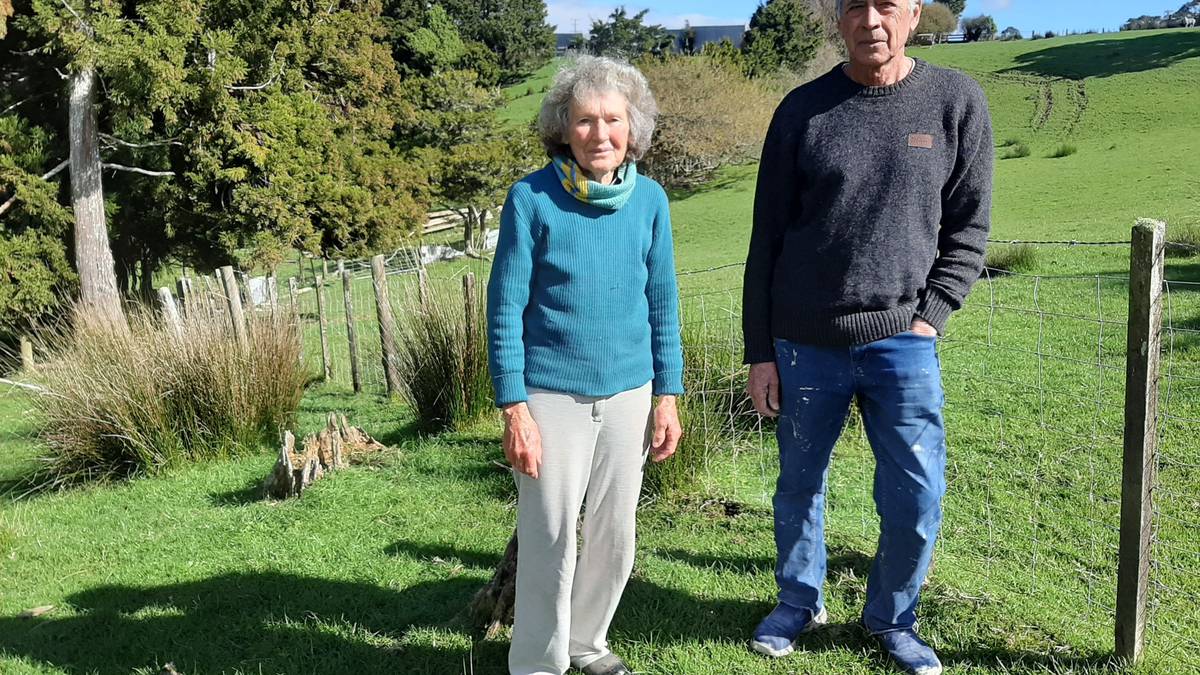Kaikohe neighbours Lily Coleman and Wayne Johnston want action taken after roaming dogs killed and mauled dozens of their livestock. The problem has been an issue for many years. Photo / Jenny Ling
Longstanding farmers in the Far North are thinking about calling it quits after decades of carnage on their livestock caused by roaming dogs.
Wandering canines have killed and mauled dozens of mainly sheep and lambs
at various farms in and around Te Iringa, in rural Kaikohe, over the last month including at Lily and John Coleman’s property and their neighbour Wayne Johnston.
Now the Northern Advocate has learned the problem stretches back about three decades, and no dog owner in the area has ever been held accountable by the authorities.
After the Northern Advocate’s September 19 story, there has been another dog attack on the Coleman’s farm, with 86-year-old John Coleman facing the distressing task of putting more maimed animals out of their misery.
After three dog attacks which killed 24 sheep and lambs, along with one calf and seven laying hens, the dogs returned overnight on Monday, killing seven more lambs and ewes.
Coleman was not sure how many other animals left injured would have to be put down.
“The damage is done, there’s just about none left.
“We’ve been alright the last couple of days, then my son went past and said the dogs have been back.
“We went and had a look and sure enough there’s three ewes and four lambs gone.
“The lambs have been ripped open, it’s terrible. We’ve got to go round and put anything down that can’t be fixed up.”
The Colemans have seen two tan and two black dogs on their property around the time of the attacks.
Wayne Johnston, who lives nearby, believes different dogs of the same pitbull or pig dog-type breed killed seven of his sheep, which he had grazing at a neighbour’s place.
The neighbour shot one of the dogs, and Johnston shot another.
But Johnston said with dogs still on the loose, there was no point having sheep on his lifestyle block any longer.
Richard Tylden, who owns a 400ha sheep and cattle farm in the area, said the problem has been ongoing for three decades.
“We’ve had 30 years of it. Not all the time, we might miss a couple of years, but it’s ongoing. Sometimes they’re pig dogs, other times they’re family mongrels.
“The sheep are so defenceless, if we get another big one [attack], I think sheep will be gone from this farm, it’ll just be cattle.”
Tylden said he hasn’t lost any livestock this year “touch wood”.
“But the two years prior to that we lost a heap of lambs and ewes.
“Our worst attack was around 70 ewes spread over several weeks.
“It took us a long time to get the dogs but we did eventually.
“The worst in one afternoon was 54 ewes.
“We got those dogs straight away but not before they did the damage.
“It’s very frustrating, if you don’t get the dogs, it’s a real worry, you can’t sleep.”
Tylden said he has reported some of the attacks to the council.
“They have helped in the past, when we lost the 70 they came out and helped, they shot the first dog.
“The others went home to where they come from. I shot the other three at the owner’s place, he let me do it.”
Tylden said the council “have to step up and go and check for unregistered dogs”.
“Years ago I used to say to them come out and have a look around, and they did … it was no problem for them to deal to the dogs.
“They don’t seem to be as good these days.
“People have to be more responsible with their dogs and keep them tied up. And not have so many dogs.”
The Colemans also phoned animal control, who brought out dog traps which were unsuccessful. After the most recent incident, they caught “two mastiff dogs which were not registered”, John Coleman said.
Council environmental services manager Rochelle Deane said animal management officers were on site on September 20 “investigating the situation”.
Two dogs were sighted on the Coleman’s property and one of those dogs was destroyed by a farmer, she said.
“A second dog matching the description has been located and surrendered to animal management.”
However, no action would be taken because “there is no evidence to support identification”, Deane said. She could not say what would happen to the dog.
Deane said additional dogs and dog owners within the area “have been identified for registration purposes during the officers’ investigation”.
“A number of unregistered dogs have been recorded as a result of this incident,” Deane said.
However, she could not say what, if any, action would be taken regarding them.
Coleman said, like his neighbours, he is also considering not having sheep on his lifestyle block.
“We’ll have to go out of sheep.
“The cost to replace them and the loss … what do you do?”
The Colemans have had a few phone calls after the story, including one kind person who “came around and donated $100 toward the vet fees”.




